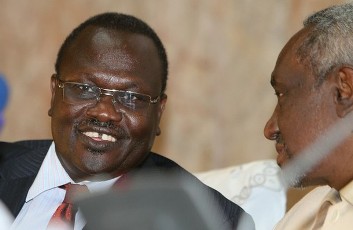South Sudan forms high level committee for dialogue with Sudan
June 14, 2013 (JUBA) – South Sudan has formed a high level political committee to dialogue with the neighbouring Sudan to defuse the current oil row which has threatened to invalidate the cooperation agreements signed by the two nations in September last year.

The official spokesperson of the government, Barnaba Marial Benjamin, told the press that the country’s vice president, Riek Machar, was mandated by a cabinet resolution to lead a high level delegation to Khartoum and engage his Sudanese counter-part, Ali Osman Taha, to salvage the agreements.
Machar, he said, will travel to Khartoum with a number of key ministers and discuss bilateral ties and the implementation of the whole cooperation agreements, using the mechanisms provided in the agreement.
Sudanese president Omer Hassan Al-Bashir on Saturday 8 June directed his oil minister to block the oil flow, accusing Juba of harbouring and arming a coalition of rebel groups fighting the government. Juba denied the accusation and counter-accused Khartoum of supporting its rebels including David Yau Yau who currently battles the government in Jonglei state.
Sudanese officials said that oil would not keep flowing without the implementation of security package in the agreement and demanded to discuss ways to prevent cross border attacks or receiving support through the South Sudan.
If Sudan is ready, he said, the vice-president and his accompanying delegation will travel to Khartoum “any time” soon and hold a direct negotiation with the Sudanese senior officials. But he did not mention when the committee would travel to Khartoum.
“We are ready to engage in open discussions that look at how we can have a win-win solution in a new context, not in the context of take it all but the in context that the outcome would be acceptable to all the parties and for the benefits of the two nations”, he stressed.
Under the mechanisms of the cooperation agreements a high level committee was to be formed and co-chaired by the vice-president of each country with membership of ministers concerned.
Machar’s High Level Committee (HLC) under the cooperation agreements is mandated to “oversee and coordinate the implementation of the Cooperation Agreement; oversee and coordinate the monitoring and evaluation of the Cooperation Agreement; and direct and oversee the work of the Joint Implementation Committee (JIC)”.
JIC shall be co-chaired by the foreign ministers in the two countries and shall serve as the secretariat and joint rapporteurs for the HLC.
The HLC shall report regularly to the heads of state [Al-Bashir and Kiir] and may refer any matter to them for decision or guidance.
The African Union urged the two parties to resume direct talks and said that the chairman of the mediation Thabo Mbeki had sent “urgent proposals” to Khartoum and Juba to settle this new crisis.
Also, the international community called on the two countries to commit themselves to the implementation of the signed agreements, pointing that all their differences can be resolved through it.
Following Bashir’s decision to close oil pipeline, Sudan said there is a delay of 60 days before to shut it down. Khartoum also threatened to suspend the whole cooperation agreement with South Sudan.
The former Sudan split into two countries in July 2011 and carried over some of the outstanding issues including their borders, citizenship, trade, Abyei, security and oil, among others.
The split came as a result of a referendum vote on the right to self-determination in accordance with the 2005’s comprehensive peace agreement (CPA) that ended 21 years of war between the two ex-foes.
In order to resolve the outstanding issues, a cooperation agreement was signed on 27 September 2012 . This treaty incorporates nine agreements including oil transit fees to allow the South Sudan’s oil to transport through the oil pipeline to the international markets via Port Sudan. An implementation matrix was also signed in March 2013.
(ST)
